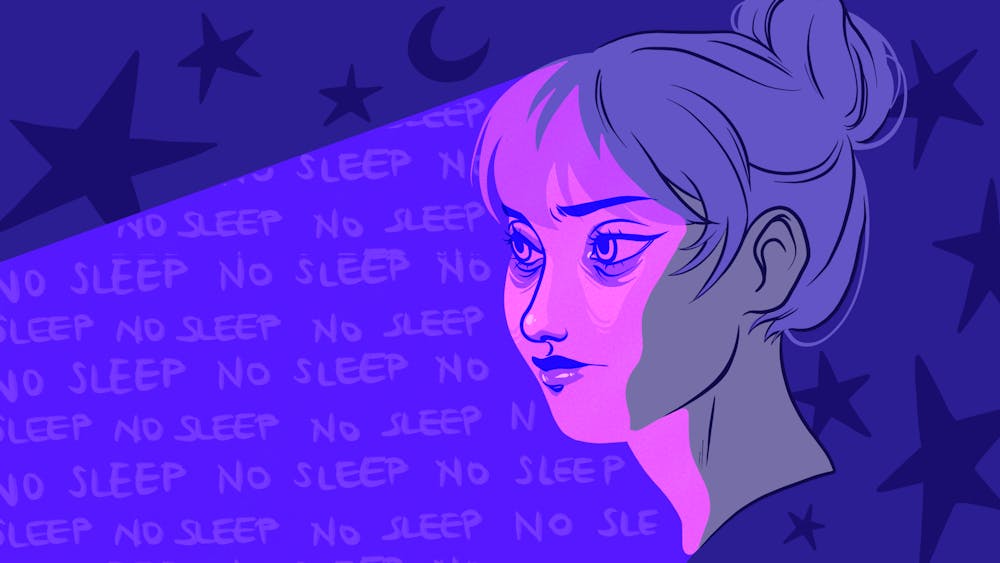It’s four in the morning and you have to wake up for a recitation in six hours, but the essay you’re working on just isn’t getting done—not to mention the quiz material you’re simultaneously attempting to cram into your head. Though your eyes are slipping shut, you push through to finish these assignments now, because tomorrow’s Friday and you’ve already made plans. It’s perfectly healthy to function on an hour of sleep and three Red Bulls, right?
As we pass over the stress of midterms and barrel towards finals season, this situation becomes more and more relatable to many academically diligent students. With coursework piling up and the need to maintain the “work hard, play hard” Penn aesthetic, sleep often takes a backseat to our academic, work, and social endeavors. It doesn’t help that social media and our peers make sleep deprivation seem like just another component of what it means to be successful in college. Van Pelt’s 24 hour floor and always–open dorm lounges further encourage the idea that maximum productivity should be a constant goal to work towards.
Heewon Kim (C' 22), a senior majoring in biology, credits her inconsistent sleep schedule to academic pressures. “I feel like I need to study a lot more to catch up with others in terms of exams,” she says. “I’ve pulled many, many all–nighters, and pulling just one all–nighter affects the next day of sleep, so it’s just a constant cycle.”
This collective prioritization of productivity over sleep shows in the numbers. A 2017 psychology study found that 74% of college students fit some of the criteria and 51.9% fit all of the criteria of having an insomnia disorder according to the DSM–5. Amadou Gueye (C '25), a first year mechanical engineering student, characterized Penn’s sleep culture as one of competition. “People are like ‘Oh, I got like 2 hours of sleep’, and are flexing it,” he says. There’s a constant pressure to always be performing at the highest level, and sleeping soundly could be considered a sign of laziness or lack of ambition by others.
Many of us claim that we can function just fine on four or five hours of sleep, but sleep research largely argues otherwise. Sleep deprivation doesn’t always look like simply going to sleep late and waking up early; it also looks like the many little unhealthy sleep habits we accrue that increase our ever–mounting sleep debt. What do these harmful sleep habits look like, and is it possible to denormalize them among college students to help ourselves build healthier sleep habits in the long term?
Napping is probably the go–to solution for missing out on the previous night’s sleep, especially among college students who may have large free blocks of time throughout the day and a lot to do at night. But naps aren’t a good habit to keep up daily—and it definitely can’t eliminate sleep debt. Shorter naps (less than an hour) are healthier than longer naps, but nevertheless the body doesn’t get the ability to go into much needed REM sleep stages during the average nap.
For those of us whose inconsistent sleep habits make it difficult to fall and stay asleep, melatonin is seen as the cure–all sleep supplement. Our bodies naturally release the hormone melatonin at night to prepare our bodies for sleep, but if your circadian rhythm has been thrown too far off, a supplement can even out the balance. Melatonin can’t be used to completely offset the effects of a lack of sleep—it’s mostly useful if taken during the day to increase your body’s melatonin levels when the hormone otherwise wouldn’t be produced. Melatonin shouldn’t be a long–term replacement for healthy sleep cycles, as research has found that consistent use of melatonin for longer than six months to a year may offset its positive effects.
Most importantly, we can’t divorce the subject of identity politics from sleep among college students. Not everyone is experiencing sleep debt the same. The sleep gap, first observed by San Diego researchers in 2005, refers to the relative lack of sleep black people recieve in comparison to other non–black racial groups. Scientists posit that this gap could be attributed to the many additional stressors discrimination causes that limits black people, and other people of color, from sleeping soundly.
The world is a difficult place to exist in for many of us, making it hard to genuinely rest. Minority stress theory, initially coined in the context of the queer community, means that for minoritized people, the work doesn’t end at the end of the day. Minority stress theory attributes minorities’ poorer health outcomes, including those related to sleep, to this prevalent social oppression of which there is hardly any escape.
The truth is that sleeping more helps us—academically, mentally, and physically. Though we can make up for lost sleep by sleeping in on the weekends, on a day–to–day basis, habits like relying on melatonin or naps to get through the day aren’t the way to go. Among college students, we should collectively change the way we talk about sleep. This may seem like a gargantuan task, but we can keep ourselves and others in check by talking about sleep like it’s a priority, instead of a minor inconvenience in an otherwise productive schedule.
As finals season approaches, ask your friends if they’ve been sleeping. Remind yourself and others that sleep deprivation isn’t the key to success at Penn or in life. Acting as if surviving on the least amount of sleep as a competition benefits none of us. It only furthers the normalization of unhealthy habits—habits that we can and should release ourselves from. Instead, let’s destigmatize rest, because a well–rested campus is a happier and healthier campus for everyone in it.







